-
Gov.-elect JB Pritzker’s Monday inauguration will mark the beginning of the end in two separate years-long battles with the state’s largest public employee union, AFSCME Council 31 — battles that have gone from the negotiating table to the Illinois Labor Relations Board, and eventually to court.
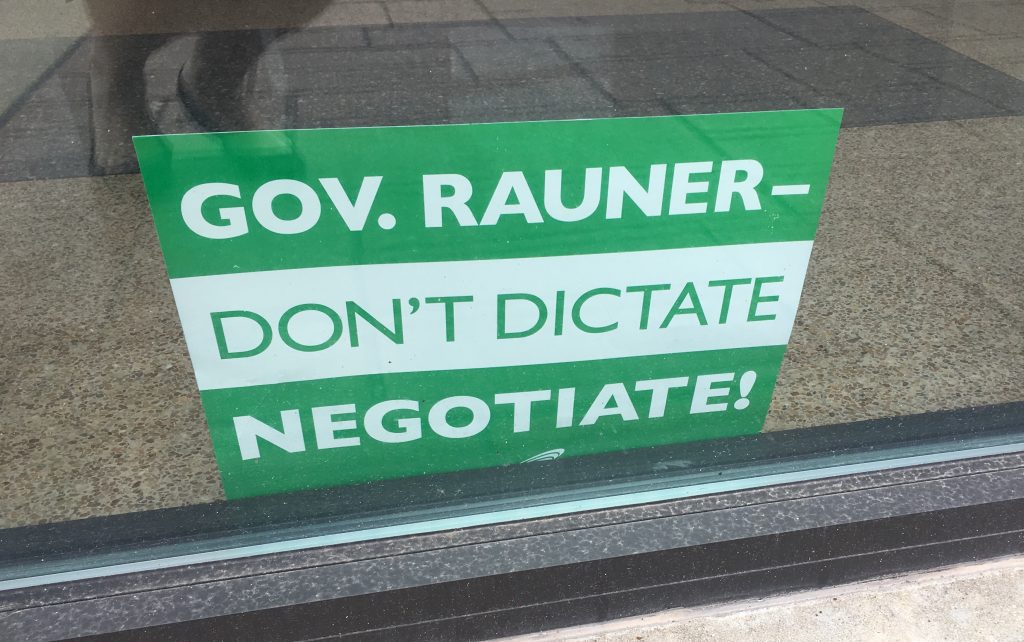 A sign urging Gov. Bruce Rauner to keep negotiating on a contract with AFSCME is displayed in the window of the union's Springfield office on February 23, 2017 — the same day the union authorized a strike, which never ended up happening.
A sign urging Gov. Bruce Rauner to keep negotiating on a contract with AFSCME is displayed in the window of the union's Springfield office on February 23, 2017 — the same day the union authorized a strike, which never ended up happening.
-
Illinois’ first openly gay lawmaker, State Rep. Greg Harris (D-Chicago), was announced Thursday as the new House majority leader, filling a role held for more than 20 years by newly retired State Rep. Barbara Flynn Currie (D-Chicago). Former State Rep. Nick Sauer (R-Lake Barrington) turned himself in to law enforcement on Thursday after a warrant was issued for his arrest after he was indicted for disseminating private photos of two ex-girlfriends. Gov.-elect JB Pritzker also established a blind trust for his assets during his time as governor.
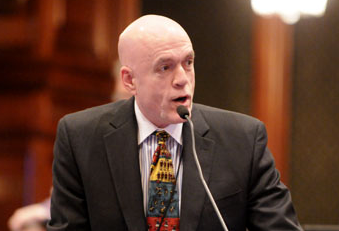 [Courtesy of GregHarris.org]
[Courtesy of GregHarris.org]
-
Gov.-elect JB Pritzker announced another round of appointments to his administration on Thursday, and the early group of 19 hires so far is overwhelmingly female.
-
House Speaker Mike Madigan (D-Chicago), re-elected Wednesday to the role he’s held for all but two years since 1982, chose to begin his remarks during the House inauguration ceremony looking not forward, but backward to Jan. 14, 2014.
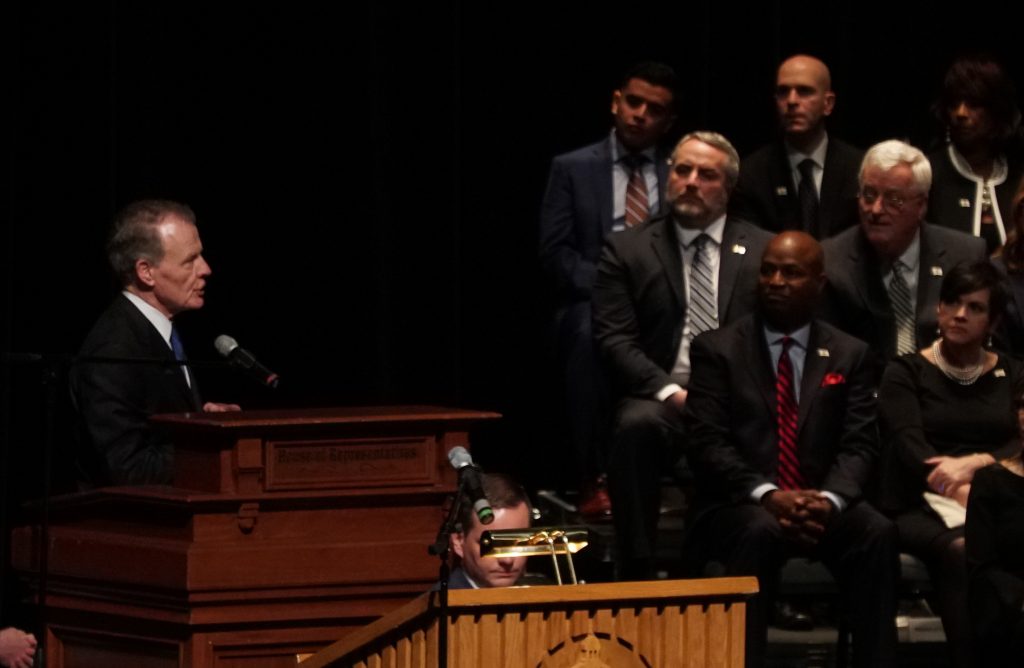 State Rep. Michael Madigan address lawmakers after winning another term as House speaker. [Lee Milner]
State Rep. Michael Madigan address lawmakers after winning another term as House speaker. [Lee Milner]
-
More than seven months after its passage, the gun dealer licensing bill has been released from legislative limbo in preparation to be sent to Gov.-elect JB Pritzker’s desk after the Democrat is sworn in next week. The Senate on Wednesday morning is expected to take up bills that would give state agency heads and their deputies a pay raise and effectively fire the board of the Illinois Tollway. The House passed those bills on Tuesday.
-
On the eve of an inauguration that will usher in the return of one-party Democratic rule to Springfield and a shrunken nucleus of GOP power in state government, House Minority Leader Jim Durkin (R-Western Springs) was surprisingly upbeat Tuesday for a Republican whose own caucus suffered major losses in the November election.
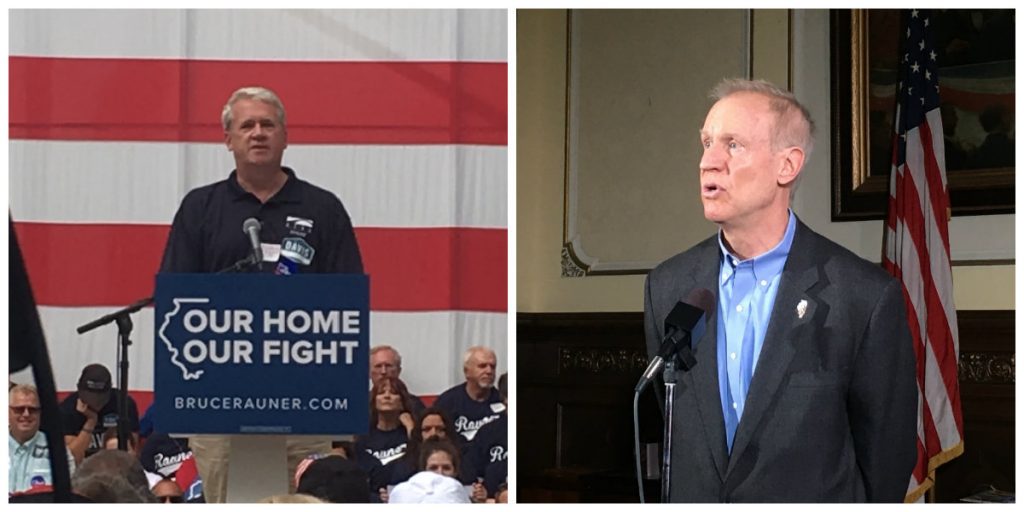
-
Longtime State Rep. Lou Lang (D-Skokie) is the 48th and likely final lawmaker leaving the General Assembly after his surprise announcement Monday. Meanwhile, the state has seen a modest increase in tax revenue in the first half of the fiscal year as compared with halfway through the 2018 fiscal year, according to a new report from the Commission on Government Forecasting and Accountability.
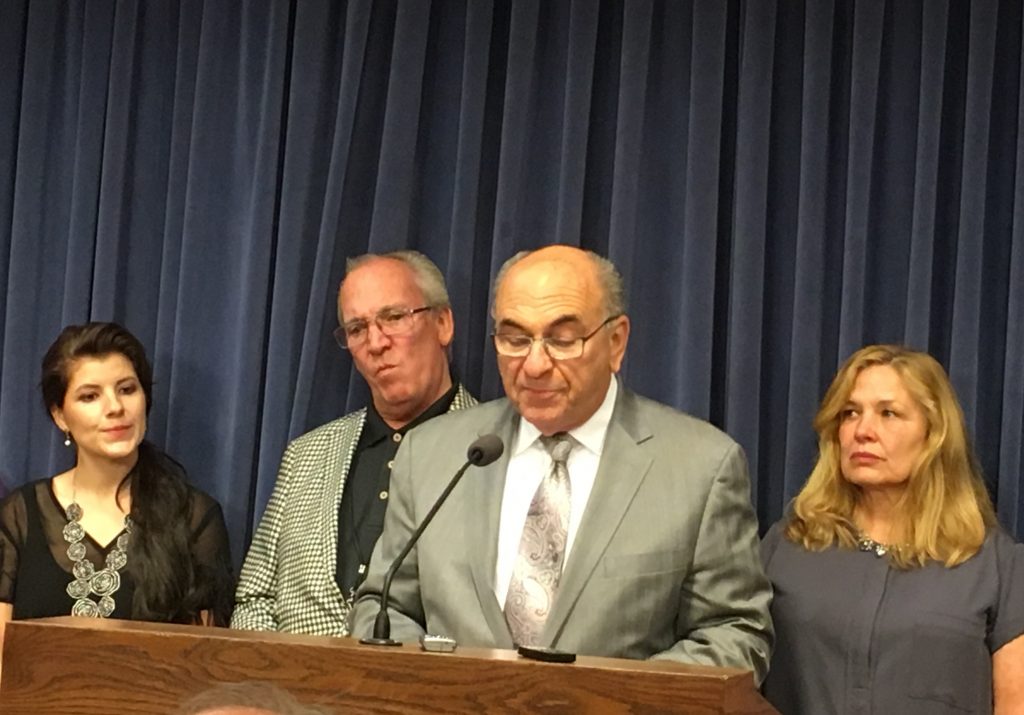 State Rep. Lou Lang (D-Skokie) addresses allegations of harassment against him at the Statehouse on May 31, 2018. [Hannah Meisel/The Daily Line]
State Rep. Lou Lang (D-Skokie) addresses allegations of harassment against him at the Statehouse on May 31, 2018. [Hannah Meisel/The Daily Line]
-
Two bills prioritized by Gov.-elect JB Pritzker are set to make their way onto the House and Senate floors on Tuesday, the second and final day of Lame Duck session for the 100th General Assembly.
-
 New Democratic State Sens. Robert Peters and Ram Villivalam.
New Democratic State Sens. Robert Peters and Ram Villivalam.
Though Lame Duck action under the dome isn’t set to commence until noon on Monday, ahead of the swearing-in of the 101st General Assembly on Wednesday, the weekend had plenty of political action with North Side and South Side residents getting new representatives in the Illinois Senate. -
A flood of lawmakers have left the General Assembly in the past two years — either by resignation, retirement or suffering a loss at the ballot box — taking with them many decades of experience.
The most experienced of those lawmakers are also eligible to take with them any campaign cash raised before June 30, 1998, to use however they want — even for personal endeavors.
A 1999 campaign finance reform law prohibited the spending of money in a political action committee on any personal pursuits for money raised after June 30, 1998. Any money that came in or political action committees formed after that date had to honor that law and could only be spent on political or governmental purposes, given away to charity or be returned to donors.
But the total dollar amount in a politician’s coffers as of June 30, 1998 serves as the upper limit of funds that politician could eventually use for personal benefit. Even if those funds were to be depleted over time, a politician or committee could, in theory, solicit cash to bring them back up to the level of funding they had on June 30, 1998 and take that cash for personal use.
This week marks not just the end of the 100th General Assembly, but also the end of a wave of retirees from that body. The most experienced of those retirees — ones who are eligible to cash out some of their campaign accounts for personal use — have nearly a combined two centuries’ worth of experience in the legislature.
Their campaign accounts have an even longer tenure.
This elite group of grandfathered-in lawmakers is a small club of seven who have already departed from the General Assembly or will have their final day in Springfield on Tuesday.
In fact, four of the seven are already gone, the most recent of which was State Rep. Dan Burke (D-Chicago), who tendered his retirement Dec. 30, just days before his older brother Ald. Ed Burke (14) was charged with attempted extortion.
Rep. Burke lost his primary to 26-year-old Aaron Ortiz in a progressive wave also threatening to take out Ald. Burke. Just last week, progressive boss and new U.S. Rep. Jesus “Chuy” Garcia endorsed Ortiz’s girlfriend, engineer Tanya Patino in the race for the 14th Ward seat on the Chicago City Council.
Related: Ald. Ed Burke charged with attempted extortion, feds say; FBI agents raid Ald. Ed Burke’s ward, City Hall offices, setting off shockwaves
State Reps. Bill Mitchell (R-Forsyth), David Harris (R-Arlington Heights) and Majority Leader Barbara Flynn Currie (D-Chicago) are the only lawmakers whose campaign accounts existed before June 30, 1998 who will remain members of the General Assembly until it’s adjourned sine die on Tuesday.
The other five — Burke, State Sen. Donne Trotter (D-Chicago), Senate Minority Leader Christine Radogno (R-Lemont) and State Rep. Patti Bellock (R-Hinsdale) — have retired, or in Bellock’s case, gone on to lead a state agency this summer.
Some of those accounts were extremely slim on the magic date of June 30, 1998. Bellock, for example, had only $240.47 in her account as of that date. Mitchell had a bit more — $3,153 was hanging out in his campaign committee when he filed his June 30, 1998 quarterly report.
Harris, who had served in the House from 1983 to 1993, reported $26,398.66 in his PAC in mid-1998, while he was serving in various positions within the Illinois Army and Air National Guard after a primary loss in 1992. He eventually would return to the House in 2011, and is set to become the head of Illinois’ Department of Revenue once Gov.-elect JB Pritzker takes office Jan. 14.
Radogno’s PAC, which has existed since 1995, had $36,157.07 in it on June 30, 1998. Since resigning from her leadership position in the summer of 2017 in the heat of the last days of a budget impasse, Radogno’s committee has reported thousands in spending, mostly for office supplies. She’s also made quite a few sizable donations to fellow Republicans.
Burke had $94,450 in his committee as of June 30, 1998 — not nearly as much as brother Ald. Burke with $2.4 million on that date, but twice as much as sister-in-law Illinois Supreme Court Justice Anne Burke, who had $46,937 in her own account as of the magic date.
The committee with the most eligible money of the seven retiring or retired belongs to the lawmaker with the most experience: Majority Leader Currie. Currie’s committee was formed on Nov. 13, 1977, a little over a year before she was sworn into the House in 1979. Forty years later, Currie is eligible to cash out on the $166,944 that was in her account as of June 30, 1998.
In years past, former politicians used the money left over in their campaign accounts as nest eggs for retirement, and at least one former lawmaker’s family used the cash for his funeral.
A 2016 Illinois Times investigation found that former Gov. Jim Edgar used some of his leftover money on fitted suits, which were written into law as valid use for campaign cash so long as it directly relates to politics; after all, politicians can’t campaign in rags.
Campaign finance reports are specific to a point, but the reasons behind spending a certain dollar amount aren’t always clear, so it could be difficult to tell in the future whether retired lawmakers’ spending is for business or pleasure, or a mix of both. But with the exit of these seven lawmakers and their campaign cash, the number of politicians’ whose campaign committees are grandfathered are dwindling.
Do you like this page?











